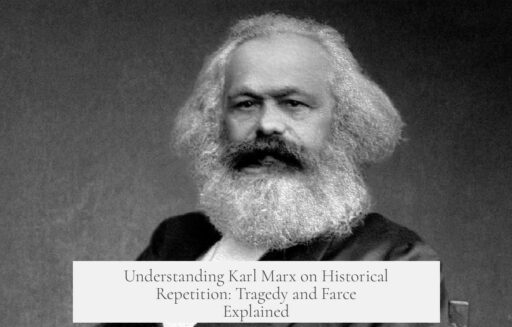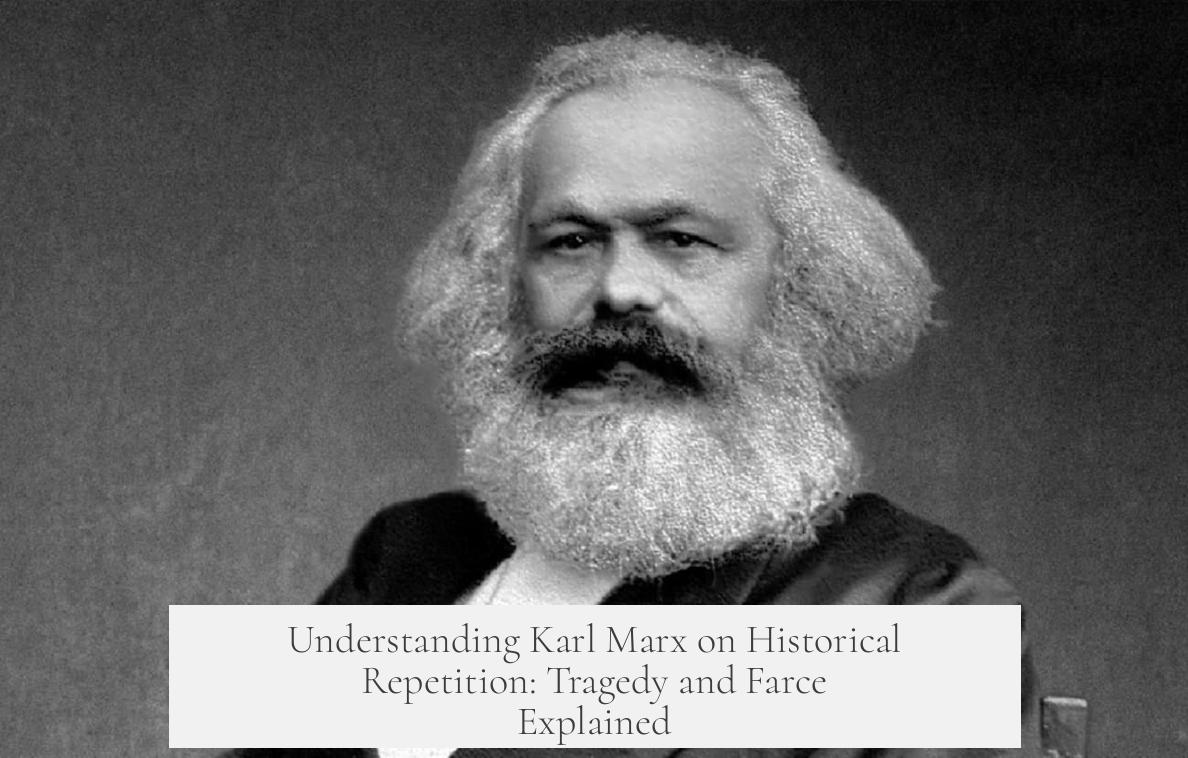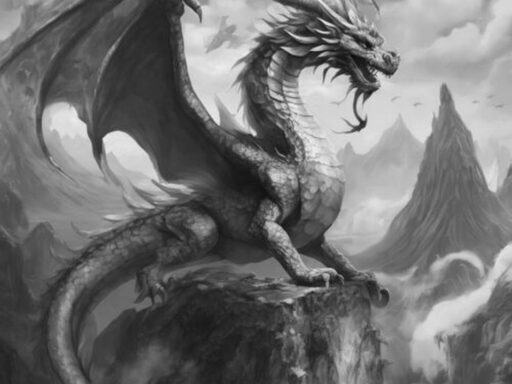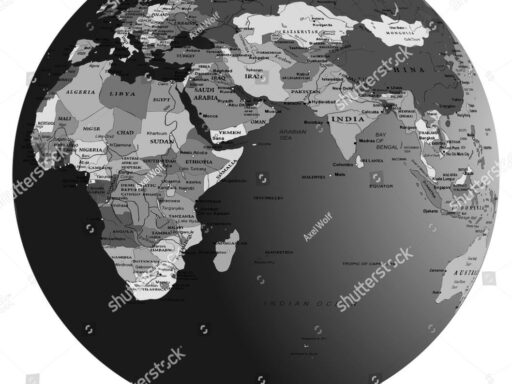Karl Marx’s quote “history repeats itself first as tragedy, second as farce” originates from his 1852 political essay The Eighteenth Brumaire of Louis Bonaparte. This statement critiques the cycle of historical events, particularly the repeated patterns of revolutionary upheaval and authoritarian takeover seen in 19th century France. Marx emphasizes that the first occurrence is serious and transformative—a tragedy—while the recurrence is a distorted, ridiculed imitation—a farce.
Marx uses the rise of Louis-Napoleon Bonaparte as a case study to explain this idea. Louis-Napoleon, elected president in 1848, later seized dictatorial power in 1851. Marx compares this to the original Napoleonic coup of 1799, when Napoleon I overthrew the French Directory during the revolutionary period known as the Eighteenth Brumaire (a specific date on the French Revolutionary calendar).
This allusion ties the two events. Napoleon I’s 1799 coup was a historical tragedy. It marked the violent end of revolutionary ideals and the establishment of imperial rule. Louis-Napoleon’s coup, however, is a farcical repetition of this earlier episode. Marx argues that Louis-Napoleon’s seizure of power is a mockery—a diminished and somewhat absurd replay of his uncle’s rise.
Marx references the famous German philosopher Hegel, who remarked that historical figures and events tend to appear twice. Marx adds that the first time they come as tragedy, the second as farce. The tragedy involves genuine revolutionary change, sacrifice, and transformation. The farce, by contrast, is superficial, marked by weakened ideals, cynicism, and failed attempts to revive past glories.
In The Eighteenth Brumaire, Marx illustrates this by comparing key figures from two French revolutions. Revolutionary heroes like Danton and Robespierre of the 1790s correspond to their less impactful successors in the 1848 wave, such as Caussidière and Louis Blanc. This substitution symbolizes the decline in revolutionary fervor. Marx portrays the second revolution’s characters as weaker imitations, lacking the original’s seriousness. This mirrors the quote’s distinction between tragedy and farce.
The younger Napoleon’s proclamation of himself as emperor after Marx’s writing solidifies this point. His coronation became the farcical reenactment of his uncle’s historic imperial crowning. Marx highlights this surreal repetition as a sign that history not only repeats but degrades its content and seriousness the second time. The 1848 revolution effectively devolved into a failed replay of 1789, ending in authoritarian rule rather than genuine democratic reform.
Marx uses this analysis not just to criticize historical actors but to unveil deeper class dynamics. He identifies the role of the lumpenproletariat—marginalized social groups without class consciousness—in supporting Louis-Napoleon’s ascension. Louis-Napoleon gained power partly by manipulating this group through material gifts and propaganda. Marx contrasts this with the urban proletariat, who could develop political awareness and drive meaningful change. The peasantry is also separated from proletarians, seen as unable to build a shared class identity due to their isolated, parcel-based labor.
This context reveals Marx’s evolving theory of political power. Propaganda and public opinion become key tools—beyond pure economic forces—in shaping political outcomes. The farcical repetition happens because mass opinion and political manipulation allow weaker actors to seize power without genuine revolutionary legitimacy.
In essence, Marx’s phrase warns that revolutionary history may repeat itself, but the second time it is a weakened, mocking version of the original, stripped of serious purpose. It highlights cycles where high ideals give way to cynical mimicry and authoritarian rule.
| Aspect | Explanation |
|---|---|
| Original Event (Tragedy) | 1789 French Revolution and 1799 Napoleon I coup: genuine revolutionary change and transformation. |
| Repeated Event (Farce) | 1848 Revolution and Louis-Napoleon’s 1851 coup: superficial imitation ending in dictatorship. |
| Hegel’s Influence | Historical facts and figures appear twice; Marx adds that repetition downgrades from tragedy to farce. |
| Class Dynamics | Lumpenproletariat supports second coup; lack of class consciousness weakens revolutionary potential. |
| Political Tools | Government propaganda and public opinion manipulation critical in enabling farce. |
- Marx’s quote highlights two-stage repetition in history: first a tragic event, then a degraded farcical replay.
- The Eighteenth Brumaire compares Napoleon I’s genuine revolution with Louis-Napoleon’s cynical dictatorship.
- Repetition reflects declining political seriousness and revolutionary purpose over time.
- Class consciousness and propaganda shape the difference between tragedy and farce.
- Lumpenproletariat’s manipulation marks a key factor in enabling the farcical repetition.
What Does Karl Marx Mean by “History Repeats Itself, First as Tragedy, Second as Farce”?
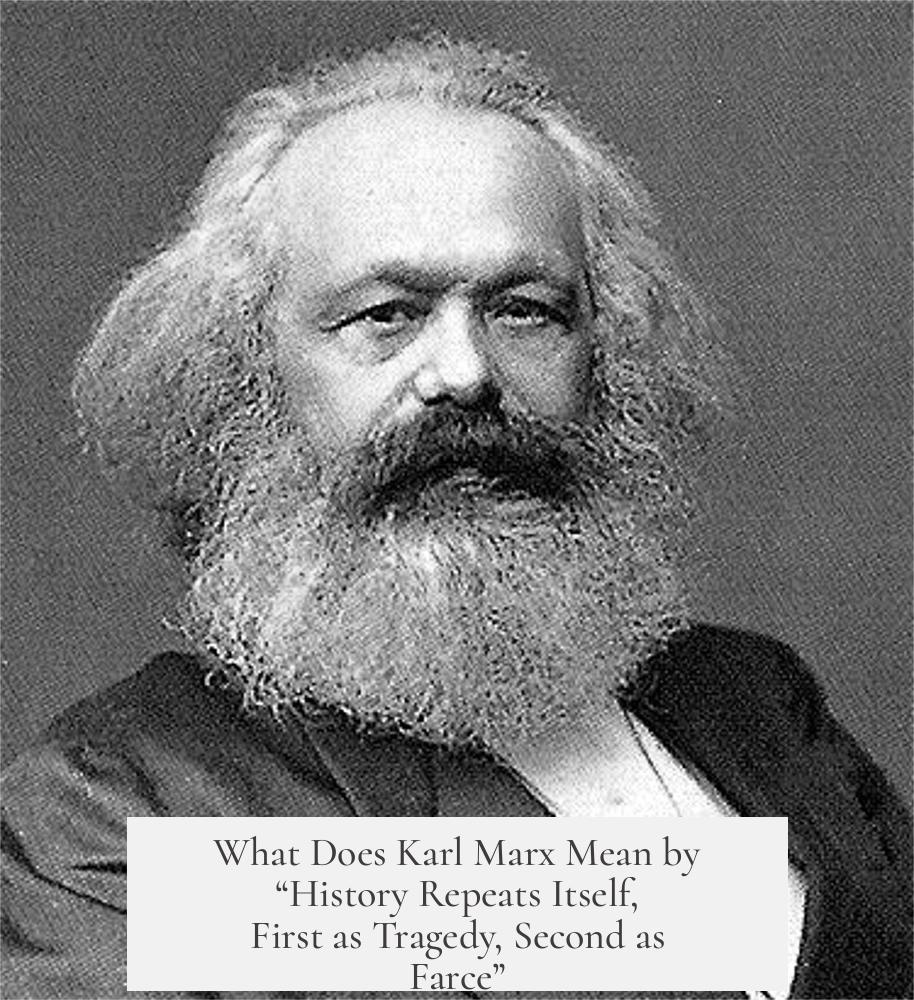
Karl Marx’s famous quote, “history repeats itself, first as tragedy, second as farce,” speaks volumes more than just a catchy phrase. But what does it actually mean? Why does Marx see history not just repeating but doing so in two very different ways? Let’s dive into the origin and deeper implications of this statement.
The Origin: A Close Look at “The Eighteenth Brumaire of Louis Bonaparte”
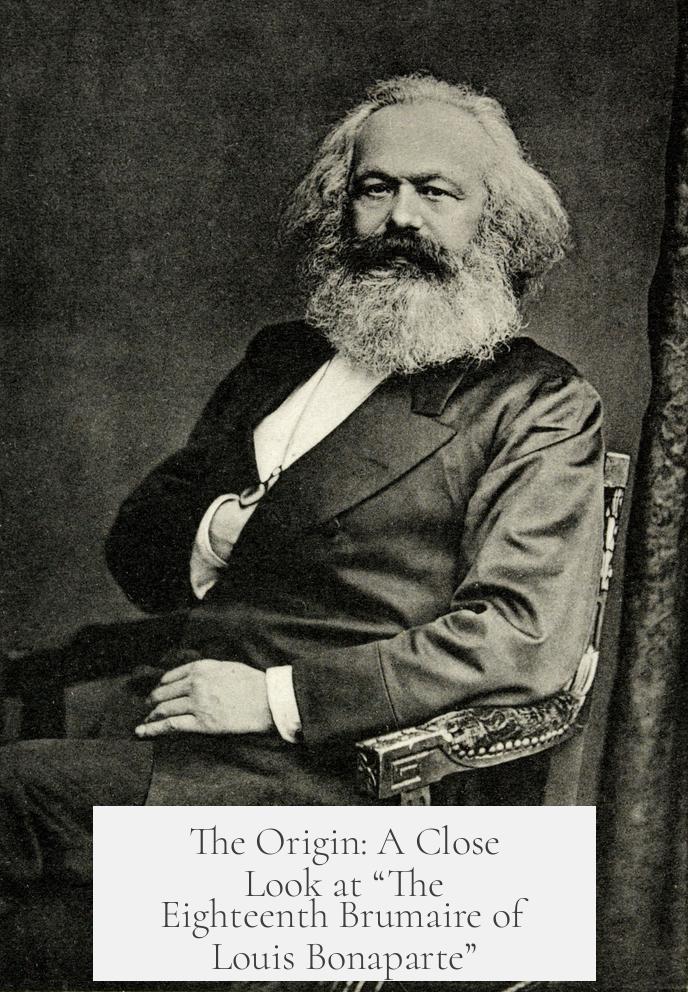
This line comes from Marx’s political analysis essay Der achtzehnte Brumaire des Louis Bonaparte, better known in English as The Eighteenth Brumaire of Louis Bonaparte. Published in 1852, this work dissects the rise of Louis-Napoleon Bonaparte, who was elected President of France’s Second Republic in 1848 and later declared himself Emperor in 1851.
Marx compares Louis-Napoleon’s ascent to that of his famous uncle, Napoleon I. The title itself refers to the date 18 Brumaire VIII (9 November 1799), the day Napoleon I seized power and established his dictatorship following the first French Revolution of 1789.
The Twice-Told Tale: History’s Repetition with a Twist
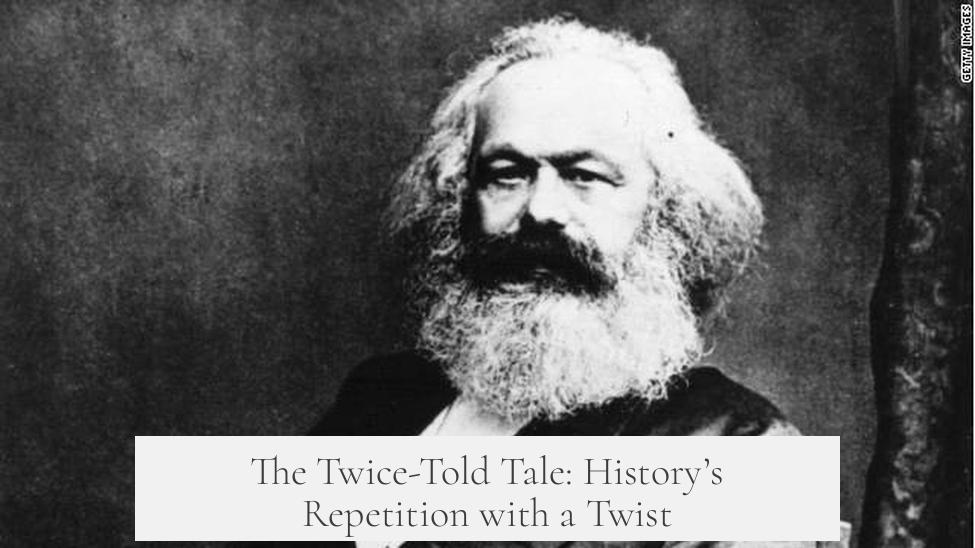
Here, Marx draws on a remark by the German philosopher Hegel, who noted that “all great world-historic facts and personages appear, so to speak, twice.” But Marx adds a twist: the first time it plays out as a tragedy, the second time as a farce.
Why this distinction? The initial occurrence—the French Revolution of 1789 and the rise of Napoleon I—was a massive historical upheaval with profound social and political changes. It was violent, serious, and often tragic. Lots of lives and ideals were lost or crushed.
The 1848 revolution and Louis-Napoleon’s rise, by contrast, was a much weaker shadow of the first. It lacked the original’s grandeur and seriousness, showing instead a sad imitation with flashy theatrics and nonsense. It’s like watching a serious drama replayed as a bad comedy.
Tragedy and Farce Illustrated: The French Revolutions and Napoleons
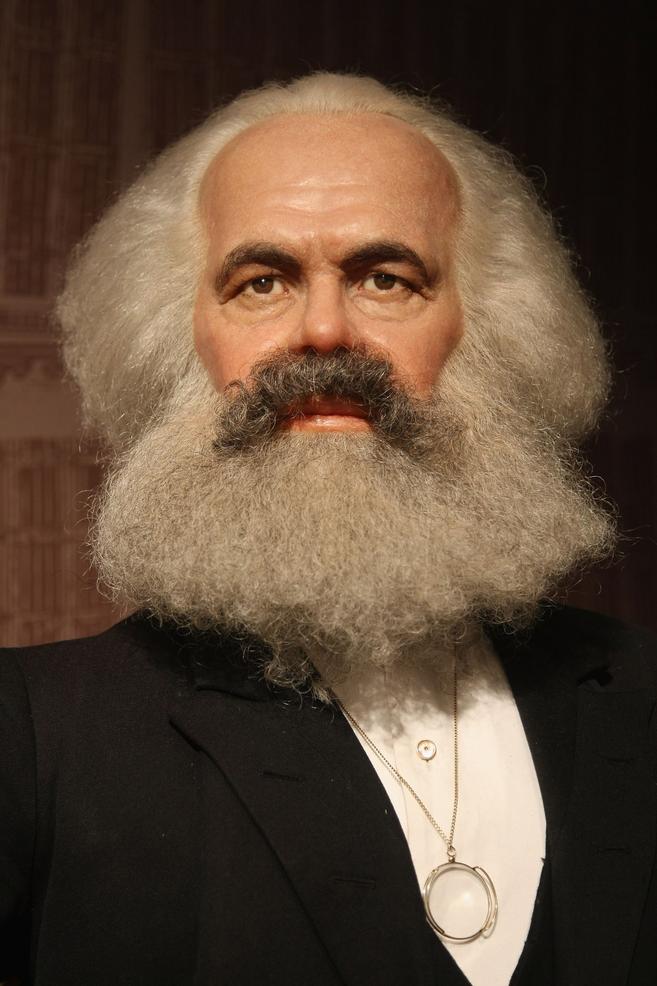
Marx’s essay points out several parallels—Caussidière for Danton, Louis Blanc for Robespierre, the Montagne of 1848-1851 for the Montagne of 1793-1795, and notably, the nephew for the uncle (Louis-Napoleon for Napoleon I). But the difference in tone is key:
- The 1789 Revolution is the tragedy. It shakes the foundations of society, tearing down the old regime with real violence and sacrifice.
- The 1848 Revolution is the farce. It imitates the first but falls short in outcome and seriousness, leading to Louis-Napoleon’s dictatorship, which Marx views as an incomplete, even comical echo of Napoleon I’s reign.
Interestingly, after Marx wrote his essay, Louis-Napoleon declared himself Emperor Napoleon III, mirroring his uncle’s career. This confirmed Marx’s “prophecy” and deepened the farcical nature of the second repetition.
Deeper Lessons: Marx’s Critique of Social Forces and Class Struggles
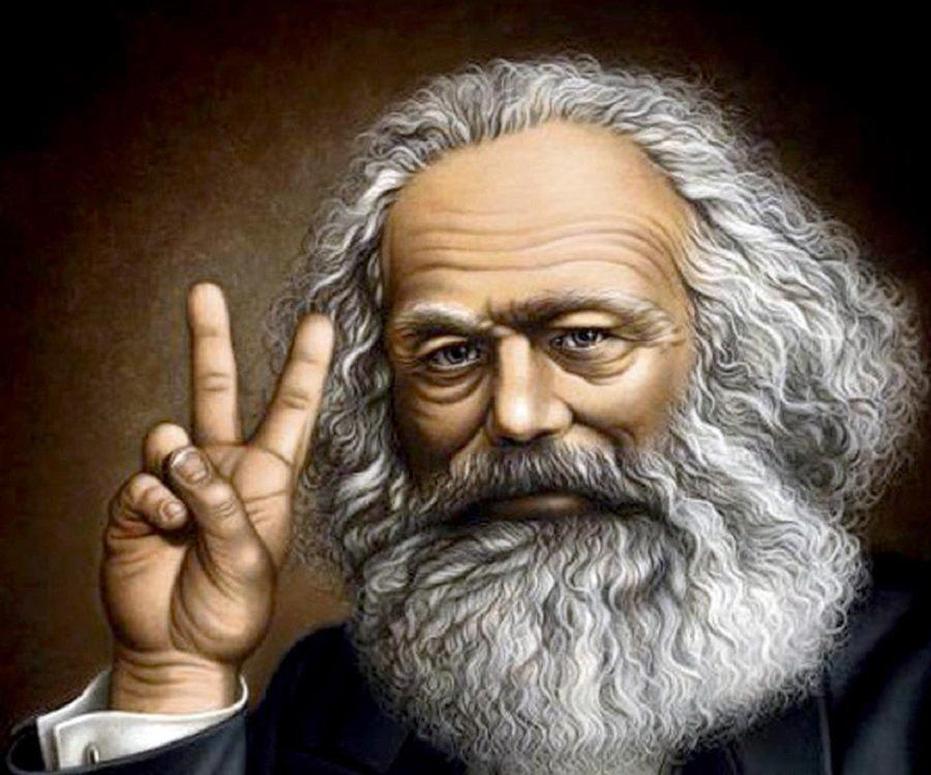
Marx does not merely mock the repetition. He digs into social dynamics that allowed Louis-Napoleon to succeed. This includes an important concept he elaborates upon in this essay: the role of the lumpenproletariat.
Who are the lumpenproletariat? They are the underclass without class consciousness—think of jobless vagabonds, petty criminals, or socially marginalized groups. Unlike the proletariat, who have shared interests as industrial workers, these groups float unmoored in society.
Louis-Napoleon exploited this group, buying their loyalty with gifts and privileges. This gave him a base of support distinct from the organized working class, enabling his coup.
Marx also separates the peasantry from the proletarian class. Because peasants work isolated plots of land, unable to develop class consciousness like city workers, they are less likely to mobilize politically. This factor weakened revolutionary potential in 1848 compared to 1789.
Finally, Marx notes a shift in how power operates — government propaganda and public opinion gain importance. The 1848 republic plays the media game better than 1789’s revolution, highlighting a more manipulative, less noble style of politics. The gap between economic forces and political life widens.
What Can Readers Take Away?
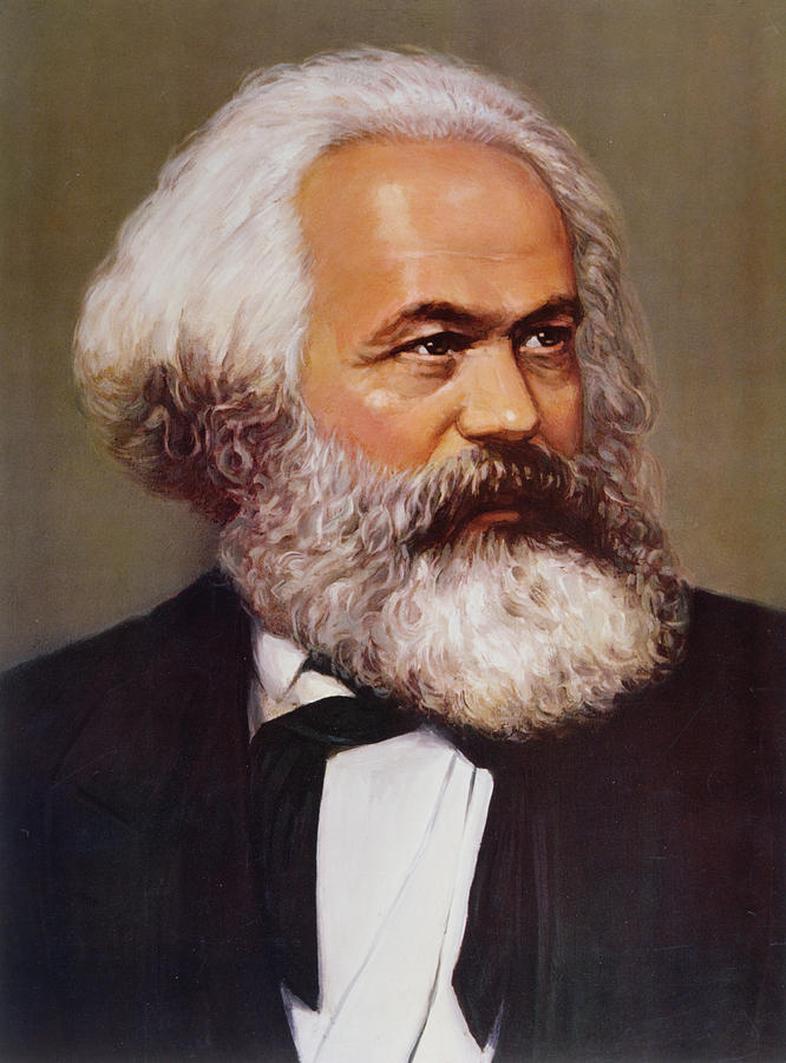
Marx’s quote isn’t just a historical jab at the Bonaparte family; it’s a warning about how societies repeat mistakes and theatrical politics. Have you noticed rulers or governments recycling old ideas but bungling the execution?
This phrase challenges us to look critically at “revolutions” and “great leaders.” Are we watching a true transformative event or a shadow play that mimics past drama without substance? It asks: is history an inspiring saga or a tiresome rerun?
Practical Application: Spotting Tragedy vs. Farce in Today’s Politics
Even today, the idea of history repeating itself as tragedy or farce helps us analyze political events and social movements. When a revolutionary wave sweeps a country, look for:
- Serious intent and deep societal change (tragedy)
- Superficial mimicry, failed imitations, or charismatic but empty leadership (farce)
Many recent political upheavals show shades of Marx’s concept. They either carry genuine transformation or devolve into caricatures of prior revolutions. Watching closely saves you from getting swept up in political theater.
In sum, Marx urges us not just to repeat past mistakes blindly, but to understand the forces at play and demand authentic change.
Conclusion: Why Marx’s Insight Endures
Marx’s quote from The Eighteenth Brumaire remains striking because it captures a paradox: history doesn’t just repeat — it repeats with rhythm and mood changes. First comes the tragedy, marked by upheaval, pain, and real change. Then, often, comes the farce, a pale shadow trying to relive that movement but falling short.
Knowing this, we become sharper political observers and cautious participants in history’s unfolding drama. We ask when leaders and events represent genuine progress—or just second acts of a play badly cast and poorly scripted.
Next time you hear about a revolution or leadership “comeback,” recall Marx’s words. Is this history making a grand, tragic statement—or a silly farce? Understanding that difference might save us from repeating fatal errors.
